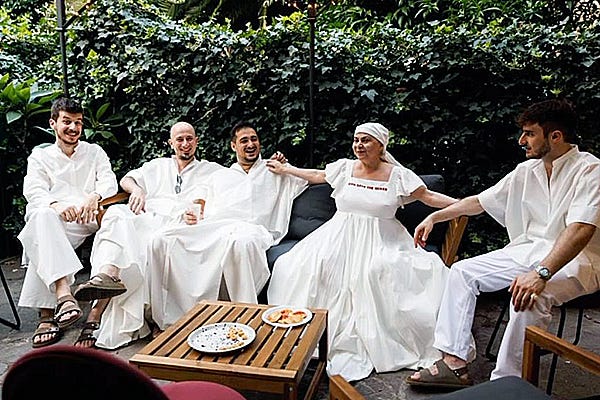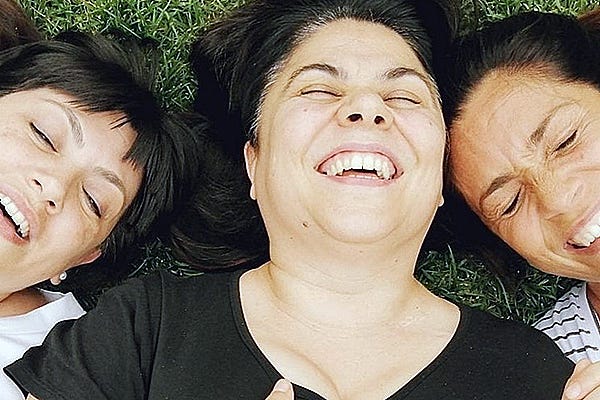I love stories of people living boldly and authentically, regardless of what the external world thinks. When the stories include admiration and acknowledgment by the outside world in ways that would not have happened just a few years ago, it is cause for celebration. Last week, The New York Times paid tribute to Michela Murgia, an Italian novelist, feminist, and outspoken advocate who championed nontraditional families in a country known for celebrating family.
Murgia died of cancer at age 51 and had a large sendoff where many gathered outside the basilica known as the "Church of the Artists" in Rome's central Piazza del Popolo. People from all walks of life paid tribute, even those in the current government whom she criticized.
A month before she died, Murgia announced she had married her life partner, Lorenzo Terenzi, for legal reasons. They put her queer family at the center of the celebrations rather than them as a couple. Her announcement after the ceremony was:
"We did it reluctantly; if we had had another way to guarantee each other's rights, we would never have resorted to such a patriarchal and limited tool, which forces us to reduce a much richer and stronger experience to the representation of the couple. ….
The ritual we would have liked does not yet exist. But it will exist, and we want to help bring it to life. In a few days in the garden … we will bring to life our idea of celebrating the queer family. Our promises will not be what we were forced to make the other day. … Our personal experience is more political than ever, and if I could leave a symbolic legacy, I would like it to be this: Another model of relationship. …"
For Murgia, the queer perspective means the possibility of not being labeled by gender and sexual orientation. And a queer family is a social pact of people who choose to live together. Her queer family over the years has included many "children of the soul," non-biological daughters and sons who came into her life via different paths, and many women very close to her. The queering of the family celebrates and tells stories of all permutations of chosen family, biological or not. Using alternative language categories, like “queer”, allows for inclusion and keeps the choice of love primary, limits possession dynamics, and multiplies love energy.
When I grew up, "queer" was pejorative toward LGBT+ people, and for many people, it still is. Since around the 1500s, the word meant something strange or peculiar. Queer has evolved to encompass sexual and gender identities other than straight and cisgender. Like other words that have been taken back and transformed to become empowering, it conveys that sexuality and gender are complex, can change over time, and don't fit into neat either/or categories. Beyond sexuality, queer is used to represent a rejection of heterosexual norms like marriage and monogamy and to politically question or open up to ways of being in the world not contained in restrictive societal norms.
Murgia was unconventional in her faith, identifying as a feminist, queer Catholic. While recognizing that people harmed by the institutional church might find it absurd, she believed the church could be renewed if the Holy Spirit opened to non-gendered queerness. Murgia said that faith is an intimate fact, often concealed by intellectuals because their credibility may be questioned.
While I cannot personally hold the inconsistencies of a faith institution with patriarchy and colonialism in its DNA, I appreciate Murgia's personal faith and capacity to do so. I am curious how she grappled with, held, and integrated these aspects of her identity. Raised Catholic myself, Christian beliefs don't best represent my spiritual worldview, and I have never affiliated with the institutional church. Yet, I also participate in institutions steeped in patriarchy and colonialism; it’s impossible not to.
We believers in vibrant communities must find ways to welcome all aspects of ourselves to them – our theism, disbelief, agnosticism, and all our beliefs about what cannot be known. We need to step outside our surface-level, like-minded clusters. But, most importantly, we do this by sharing these intimate aspects relationally, as a revelation about ourselves, rather than as normative views that others should adopt.
Murgia invited everyone to voice their deeply held beliefs central to their authenticity, even when these identities are contradictory, perhaps especially so. Murgia modeled how to be a voice of change and dissonance in our imperfect and inconsistent communities. She lived this in her faith as she, for example, stood up for bodily autonomy, including a women's right to choose whether to have a baby and everyone's right to choose euthanasia.
Theologian Marinella Perroni, who writes for the Pope's newspaper and was friends with Murgia, reflected on how her Christian creed was one of welcome and inclusiveness. Perroni wrote that Murgia's death represents a loss to the Christian family, "as hers was a brave and consistent voice, and she lived her illness with dignity, without easy rhetoric, smiling and combative until the end."
I'm grateful to Michela Murgia and people like her, who live their vibrant lives out loud and stand up for everyone's right to do the same. She modeled how to hold what can appear as incompatible identities with integrity. For all of us who don't want to be defined in restrictive, dualistic ways by others (or by ourselves), regardless of how we identify, let's celebrate the queer in all of us.







